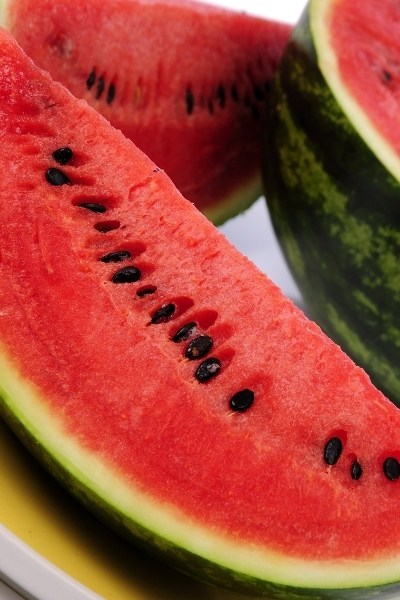If you frequently experience acid reflux symptoms like heartburn, you know how important it is to consume low-acid foods.

These types of foods help control your acid reflux and GERD symptoms, reducing how often you experience them.
Most fruits tend to have a low pH level and acid-forming properties. Because of that, you have to be careful when consuming them on acid reflux.
Still, fruits are healthy and loaded with nutrients, and some of them are rather low in acid.
For example, watermelon has one of the highest pH levels among fruits. So, does watermelon cause heartburn?
Table of Contents
Why does watermelon cause heartburn?
Watermelon has some acid-forming properties, like most other fruits. But it’s one of the easiest fruits for your stomach to digest. As a result, most doctors recommend it for people struggling with heartburn.
Watermelon is also high in vitamins and minerals as well as powerful plant compounds that can help your digestive system stay healthy. Eating it can also help prevent various health issues from developing.
Don't know what to drink? Check out these articles: 20 Most and Least Acidic Juices and 20+ Alcoholic Drinks Ranked by Acidity Level
Is watermelon acidic?
Watermelon has a pH of around 5.18-5.60. While this isn’t an extremely high pH level, watermelon is actually one of the least acidic fruits. Because of that, you can safely include it on a low-acid, stomach-friendly diet.
Remember, though, that it applies only to fresh watermelon. For example, watermelon juice is much higher in sugar and is more acidic.

As a result, drinking too much watermelon juice is a bad idea for people who frequently suffer from heartburn.
How can watermelon cause heartburn?
While watermelon is one of the best fruits for people with acid reflux, it can be a trigger food for certain individuals.
Firstly, most calories from carbohydrates in watermelon come from sugars. In fact, one cup of watermelon provides you with 9.5 g of sugar, which is a lot.
Luckily, the type of sugar found in watermelon is natural, thus healthy. But if you’re especially sensitive to sugary foods, eating too much watermelon can cause heartburn and other acid reflux symptoms.
Sugar may lead to heartburn as it inflames and irritates your digestive tract. This can make your stomach produce more gastric acid, which leads to heartburn.
So, try avoiding eating too many sugary foods if you have acid reflux.
Can eating watermelon help with heartburn?
Watermelon is one of the fruits that are the least acidic. Because of that, eating it in moderation is very unlikely to lead to heartburn. What’s more, watermelon contains around 92% of water.
Consuming foods with a high water content helps you stay hydrated and dilutes stomach acid.

This reduces the risk of heartburn and acid reflux, as the gastric acid is much weaker. So, in this way, eating watermelon can be beneficial for people with heartburn.
But remember that each person has different foods triggers. So even though eating watermelon shouldn’t give you heartburn, you might experience that it’s not the case for you.
So, always carefully add new foods to your diet to check how your body reacts to them.
Is watermelon good for you?
Watermelon is an excellent source of vitamin C. This macronutrient is responsible for the growth, development, and repair of all your body tissues and cells. Because of that, it contributes to wound healing.
It’s also an important nutrient for a healthy immune system. This is because it helps your body fight against viruses and bacteria, which lowers your risk of catching colds and other viral and bacterial diseases.
What’s more, eating watermelons has been linked to a lower risk of cancer. This is because watermelons contain powerful plant compounds and antioxidants that flush our free radicals from your body.
This prevents oxidative stress and damage to your cells, decreasing the risk of various health conditions, including cancer.
In addition, these antioxidants also have anti-inflammatory properties, which means they can help keep your digestive system healthy.
Eating watermelons may also help you load up on lycopene, a plant compound that reduces your blood pressure and the levels of ‘bad’ cholesterol in your blood.

This helps keep your cardiovascular system healthy, preventing heart disease, heart attacks, and strokes.
The same plant compound also dilates your blood vessels, which improves blood flow. This also benefits your heart health, along with heart-healthy vitamins and minerals like magnesium, potassium, and vitamin A.
A one-cup serving of watermelon provides you with 18% of your daily recommended need for vitamin A.
This micronutrient is not only good for your heart, but it can also help protect your eyes from age-related damage.
Studies show that eating vitamin A-rich foods helps prevent age-related macular degeneration, which is an eye disease that causes blindness in older adults. Because of that, eating watermelons can help keep your eyes healthy.
Additionally, watermelon is a great source of citrulline, which is an amino acid that can help with exercise performance. So, having some watermelon before or during your workout can be very beneficial for you.
Are watermelon seeds bad for heartburn?
Watermelon seeds are high in calories but also provide you with a great dose of protein. In fact, a one-ounce serving of watermelon seeds contains 16% of your daily recommended need for this macronutrient.

High-protein foods help you stay full for longer after eating, which prevents taking in too many calories. This means that you won’t eat too much in one sitting, which has been linked with heartburn and other acid reflux symptoms.
Aside from the protein content, watermelon seeds provide you with a lot of magnesium, iron, and phosphorus, which are all important minerals.
In fact, watermelon seeds are some of the best plant-based sources of iron. So, it’s a great idea to include them in your diet.
Conclusion
Watermelon is one of the least acidic foods, which makes it a great addition to a low-acid, stomach-friendly diet. It’s also high in water and important nutrients like vitamins A and C and potassium.
What’s more, this fruit is rich in antioxidants, which contribute to optimal health and prevent various health conditions, including stomach problems.
So, eating watermelon can benefit you in many ways.
Don't know what to drink? Check out these articles: 20 Most and Least Acidic Juices and 20+ Alcoholic Drinks Ranked by Acidity Level
Sources: FDA, Nutrition Data, and National Library of Medicine
